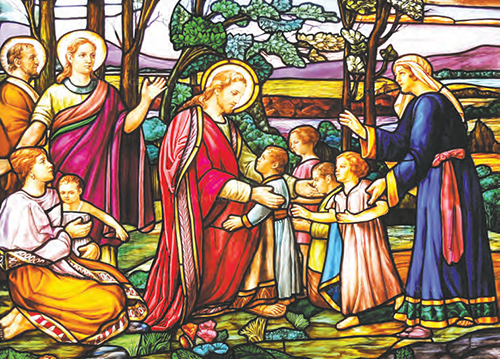Like children
Monday, January 1, 2018
*Rogelio Zelada
In the society where Jesus lived, underage children practically lacked all social recognition and were considered to be at the same level as slaves. They were not only the most defenseless and vulnerable group of people, but also the last. Therefore, it is not difficult to understand why the disciples of Jesus — who did not prevent the blind, lame, lepers, public sinners, pagans and prostitutes from approaching their teacher — firmly pushed aside a group of mothers who brought their children so Jesus could bless them.
The mothers wanted to receive from Jesus a special protection for their children, who were always threatened by illness and death. The scene seems to depict a group of peasant women, who usually lost their children before their first year of age. One third of the children born alive died during the first months, another 30 percent before age six and a few reached the age of 16.

This stained glass window depics Jesus' call to receive the Kingdom of God "like children", and to preserve and defend every child's right to life.
The scene gives Jesus the opportunity to make one of his most revealing statements: “… do not hinder them, for the kingdom of heaven belongs to such as these.”
The weakest and least recognized by society are already on the way to the Kingdom of God. It is about a total reversal of values, where “the last shall be first;” where children are the ones serving as way and models because, “unless you change and become like little children, you will never enter the kingdom of heaven.”
The words of Jesus must have caused great astonishment to the disciples. To call a person a “child” was a serious insult, because they lacked wisdom and knowledge, and they did not know how to behave properly. Children, excluded from salvation in the Pharisee mindset, are recognized and welcomed by Jesus because there is, and there will be, no difference between adults and infants in his Kingdom, nor between men and women.
It is not about the ability to understand or to probe, but about the attitude of total trust and security that a child has in his father, a perfect image of the one that all believers must have about their heavenly Father.
When the disciples were arguing about the first place that each one intends to occupy when the Kingdom comes, Jesus placed a child among them, making clear that “whoever takes the lowly position of this child is the greatest in the kingdom of heaven,” something that they probably did not completely understand.
The “lowly” becomes the paradigm of simple, unimportant folk, of those who accept with profound faith the word of Jesus. The disciples, like Jesus, should place themselves in the same closeness, trust and confidence before the Lord God and Father, the same way that a child calls his earthly father “Abba” (Dad, Daddy) with ease.
Jesus’ disposition towards the children does not seek to fill us with tenderness because of their innocence and purity. It is rather an invitation to the basics of Christian life, because we can only embrace the message of Jesus with simplicity, honesty, spontaneity, confidence, forthrightness and joy.
Only the little ones and the humble are called to discover and really see the face of God, like the shepherds at the dawn of the Nativity. They were summoned to the stable in Bethlehem to contemplate the little wonderful sign of a swaddled newborn on the straws of a manger.


Comments from readers